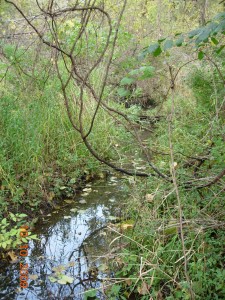This is a response to an unsigned editorial published Monday 5 October 2009 in the Western Herald concerning Western Michigan University’s designs on the Colony Farm Orchard. Since it was unsigned, it’s presumably the official position of the Herald Editorial Board. My response was published in the Herald on Monday 12 October. The version here is slightly modified from the published version.

A small stream in the springy area at the north end of the Colony Farm Orchard. Photo by Richard Brewer.
A Herald editorial endorsed WMU’s attempt to turn the protected Colony Farm Orchard into an annex of the BTR park. After a kind of cost/benefit analysis the Herald concluded that the university would make a bunch of money. Just four quick points:
1. Since WMU paid nothing for the land (bought by the state with taxpayer money), WMU ought to be able to sell it at a profit. Who couldn’t? The BTR park has done well–or so we’re told. WMU never provides cash flow figures.
But the BTR park opened near the beginning of one of the biggest booms, or bubbles, in U.S. history. The Dow Jones Industrial Average went from below 10,000 to over 14,000 between 2001 and 2007. Then the economy crashed and burned. By early 2009 the Dow dropped below 7000; the wealth that people thought had been created disappeared. Today the Dow is struggling to get back to where it was in 2001.
The current BTR Park has three unsold lots and at least two vacancies, plus the soccer field which remains to be developed. It may be years before new lots in the Annex are needed. Or they may never be needed.
2. People like me who want to save the Orchard do not object to WMU making money. Most public universities, including WMU, have been so starved by state government that to stay in operation they need to beg, borrow, and accept grants and contracts from large corporations that do not have the public good uppermost in their minds. But there are lines that should not be crossed. WMU crossed the line with their Colony Farm Orchard plans.
3. The idea that WMU deserves credit for protecting the Asylum Lake Preserve is fantasy. Its protected status is the outcome of a long, intense battle all through the 1990s between the WMU administration on one side and many people on the other. Among the WMU opponents were the Asylum Lake Preservation Association; neighborhood groups; an active, vocal group of WMU students; assorted conservationists and environmentalists; and, toward the end, the Michigan Senate following the lead of Senator Jack Welborn.
As late as 1998 when the chance of a business park on the Asylum Lake property and the Orchard was long dead, the WMU administration was still trying to turn the Asylum Lake property into a golf course! WMU lost. This land became the Asylum Lake Preserve.
4. The editorial mentions Aldo Leopold’s land ethic. Adherents to the land ethic will be opposed to WMU’s plan, but you don’t have to be an environmentalist to know it’s not right. That follows from an older, easily understood ethical principle, the idea that we keep our promises. This is the first reason why WMU should not try to overturn the dedication of the Orchard as open space. A conservation reason is not far behind: How can conservation land ever be secure if the promises of protection by land holders such as the government and the university mean nothing?
Will those who come after us at WMU say of the current leadership, They kept the faith? Or will they say, They betrayed a trust?